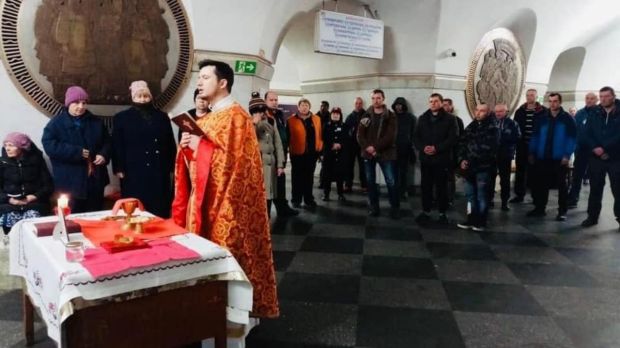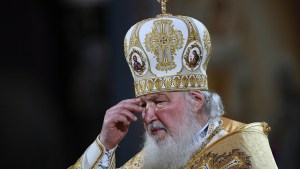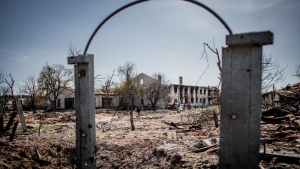From the very beginning of Russia’s invasion of Ukraine, the Catholic Church has been working to save lives in areas under attack, said the head of the Ukrainian Greek Catholic Church.
In an interview with the Ukrainian news outlet New Voice of Ukraine, His Beatitude Sviatoslav Shevchuk, major archbishop of Kyiv-Halych, detailed ways in which the Church assisted Ukrainian civilians throughout the country since the February 24 start of the war.
In addition, Archbishop Shevchuk offered his observations on the possibility of a papal visit to Ukraine, his feelings about the decision to showcase a Ukrainian and Russian carrying the cross together during the Vatican’s Good Friday Way of the Cross procession, and the path to reconciliation.
“When the first rockets landed in Kyiv on the morning of February 24, do you know what we immediately started doing? All our bishops, priests, — whether in Kyiv, Kharkiv, Chernihiv, Sumy, Odessa, or Zaporizhzhia — all rushed to save people’s lives,” Shevchuk told NV’s interviewer, Natalia Rop. “And everything else was subordinated to this imperative — to save and show the value of human life.”
He said that the Church designated three zones for the Ukrainian territory to help decide how to respond to people’s needs in varying circumstances: where there were active hostilities, such as the capital, Kyiv, at that time; places adjacent to the where fighting was taking place, and areas that were calmer, such as central and western Ukraine.
“In each zone, we as the Church, acted differently,” the major archbishop said. “In the combat zone, bishops and priests unanimously decided to stay put, to be with their people. We were there and helped others to leave. We tried to set up bomb shelters, feed the people, deliver clothing and needed aid.”
Shevchuk, who was said to be one of several Ukrainian leaders on a “hit list” of Russian President Vladimir Putin, spent the first weeks of the war in a safe house in Kyiv, but has since returned to his home next to the Patriarchal Cathedral of the Resurrection of Christ. The cathedral’s basement has served as a shelter for area families.
But Church personnel also provided help to people who wanted to leave the areas where they lived – with transportation, advice, and contacts – and arranged for delivery of humanitarian goods to hot spots.
“We created logistics centers and refugee assistance centers that are on the road,” Archbishop Shevchuk said. He said that in the first weeks of the war, the only way to go from east to west was a roundabout route that required 27 hours to drive from Kyiv to Lviv, normally a five- or six-hour drive. Yet millions of people escaped the capital and other areas along this route, he said.
“Imagine the mass of people who are on the road all these days,” Shevchuk said. “And then we tried to help refuel the cars, feed those people, keep them warm and clothed. When someone asked, we created an opportunity for them to spend the night.”
At the same time, he said, the Church worked to truck humanitarian goods from west to east. “Sometimes drivers did not have the courage to move further east,” he said. “They reached the regions south of Kyiv or Zhytomyr or Vinnytsia. And then it was necessary to reload goods from the big trucks into smaller cars and to direct them along field roads to where they were most needed.
“It was a huge job. But such logistics centers have worked for us,” he said. “I visited them and was impressed by the ingenuity of our priests and volunteers. Without the volunteers, and the spontaneous response of people from different churches who have joined the mission of our Church, it would have been difficult to do all this.”
Meanwhile, in Western Ukraine, especially Lviv, Church personnel helped refugees find lodging and support for daily life.
Catholic communities under fire
Shevchuk declined to comment on the situation of Ukrainian Greek Catholic communities in territories occupied by Russian forces. “I’d better not tell you for the sake of those people’s safety,” he said. “But I will say that we try to keep in touch with all the priests. Thank God, everyone is alive. We are looking for ways to help them. No one left their place of service.
“I am particularly pained over Mariupol,” he said, referring to the port city on the Sea of Azov that has been under siege for two months and has been almost completely destroyed. “One of our priests in Mariupol was one of the last to leave in the humanitarian corridor. And last week our house of Caritas in Mariupol was shot from a tank, and two people died. In other words, Caritas Ukraine, as a Church aid structure, worked there to the last, even in such extreme conditions. Right now, we don’t have the latest information. That outpost of the Church’s humanitarian ministry is probably still paralyzed. But we do our best.”
He spoke of two territories that have been liberated from Russian occupation, including Chernihiv, where Redemptorist priests “lived constantly under bombing raids with our people,” and Slavutych, where a priest and his wife suffered a particularly painful, but in the end joyous, ordeal. “I was so worried about him, I was praying for him so,” said Archbishop Shevchuk. “There was a moment when he managed to break through from Slavutych with our military to Kyiv in order to get humanitarian aid. I saw him here, in the Patriarchal Cathedral.
“He said that, unfortunately, he was no longer able to return quickly, because Russian tanks had closed the road on which he had come,” Shevchuk said. “He was accompanied by a high-ranking officer, to whom I said, ‘Officer, save me that priest. Because we’ll always replace tanks and houses, but I can never replace a guy like that.’ And they then somehow returned, and made their way into the besieged city. His pregnant wife had remained, experienced the beginning of the occupation, and then gave birth to their third child in a dark, cold maternity hospital by candlelight. It was like some kind of a Paschal mystery. There was a moment when Russian troops were still entering Slavutych. I immediately called him and asked, ‘What are you doing?’ And he said: ‘I’m standing with the people, holding a cross in front of a Russian tank.’ Imagine! Tears welled up in my eyes. And Slavutych persevered.”
Reacting to controversy
Archbishop Shevchuk spoke about the controversial Vatican decision to include a meditation co-written by a Ukrainian woman and a Russian woman in the Vatican’s Good Friday Way of the Cross procession. Shevchuk criticized the plan at the time, saying planners did not take into account the context of Russia’s military aggression against Ukraine.
“We communicated that idea [to the Vatican] very intensively, to change something,” he said. “Some things were changed, others were not.”
The two women did indeed carry the cross in the procession, but their meditation was not read out loud.
Reacting to the suggestion that the gesture was an attempt to foster reconciliation between Russia and Ukraine, Shevchuk said that several conditions must be met before reconciliation can be attempted. “The first condition would be: you must stop killing us,” he said. “We can’t speak of healing wounds while the enemy is still constantly wounding you. In order to reconcile, you have to be alive. That’s why I called this idea ‘untimely,’ not bad or erroneous, but untimely. In order to achieve reconciliation in the future, we all need to work very hard. And until this is done, it is not yet the time to discuss verbal or dramatized acts of reconciliation, particularly between the Ukrainian and Russian people.
“A second factor, without which there can be no beginning of reconciliation, is condemning criminal acts, in order to achieve justice for the victim,” he continued. “For example, a reconciliation between the Polish and German peoples – initiated by the Catholic episcopate in the 1960’s — would not have been possible if the Nuremberg trials had not occurred, and if Nazism as an ideology had not been condemned. In our situation, any dialogue on reconciliation between Ukrainians and Russians can only take place when the Nuremberg Trials are conducted over the present murderous ideology, which has been declared a textbook case of genocide against Ukrainians by official Russian publications, including [state news agency] RIA Novosti. We cannot talk about justice if there is no criminal trial.”
The major archbishop was also asked why Pope Francis seems reluctant to condemn Russia by name for its aggression in Ukraine.
“When we follow the personal rhetoric, language, and terminology of the pope since the beginning of the war – there’s been a certain evolution,” Shevchuk noted. “And that’s good. I would say that his language has evolved on the side of Ukraine.”
He explained that the Holy See is “trying to remain above the conflicting parties, so that it can then become a mediator … And today this factor is often used to save the lives of Ukrainians. In particular, when there is a request to open green corridors for humanitarian relief.”
There has been talk of a possible Ukraine visit by Pope Francis, who told reporters on his return to Rome from Malta that the idea is “on the table.”
“Both we and the government are working to make this visit happen,” Shevchuk said.
Finally, he answered the interviewer’s question about the validity of feeling hatred and “a thirst for revenge” among Ukrainians for what Russia has done in their country, especially since both nations have a strong Orthodox tradition.
“In these circumstances, I’ve experienced a certain evolution in my own views. Once, when I was a teacher of moral theology and lived in a world of pious and good ideas, I judged some things differently,” he said. “Certain principles and truths are eternal and cannot be denied. There are no circumstances that can overturn God’s commandment, ‘Thou shalt not kill.’
“However, when I saw how our Kyiv was bombed, and then visited all the other cities and villages liberated from the occupation, it gave me pause. This was more about the lives of real persons, than of ideas. Pope Francis stated that man is more important than ideas, and his statement gave me courage. I will say this: a person’s reaction to the circumstances of war can obviously be one of anger.
“However, I think that we Christians have a special task (and this, by the way, is one of the rules of Christian asceticism): to turn this natural feeling of anger into courage through God’s power and prayer. Courage is a virtue that takes the raw material of our anger and transforms it. And I pray fervently that in this faith of ours, seeing these crimes, we will grow from raw human anger to righteous wrath, which will constantly disturb our conscience, not allowing us to forget, giving us no right to remain silent, no right to ever sit back passively for a moment.
“We must be courageous, resilient and move towards victory,” he said. “And I wish this for all of us.”



